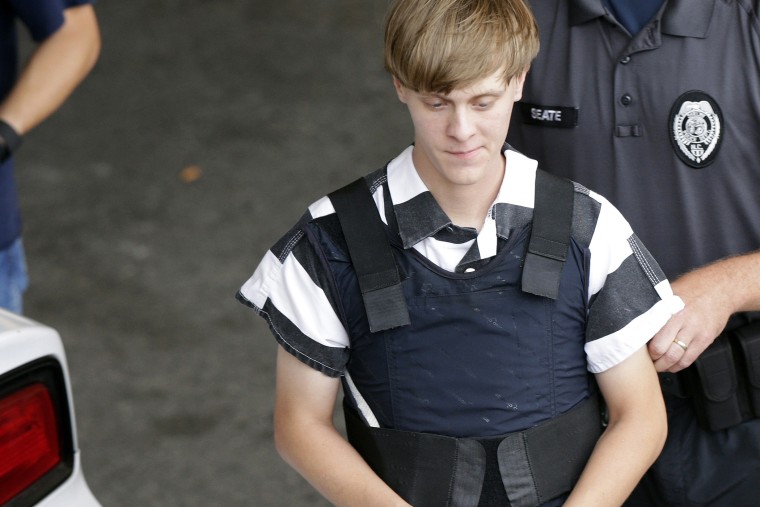CHARLESTON, South Carolina — Dylann Roof, the man accused of the mass shooting last month at a historically black church here, is expected to appear in court Thursday for a hearing on whether documents in the case will be released to the public.
The area’s chief prosecutor tweeted that Roof, 21, would appear in court.
“Defendant is expected to attend TH 10am hearing,” Chief Prosecutor Scarlett Wilson wrote.
If solicitor Wilson's Twitter message holds, and Roof appears in person on Thursday, it will be noteworthy. At an earlier arraignment, two days after the shootings, Roof appeared by video from a small, remote room, standing between two police officers.
At issue in Thursday’s hearing is a July 10 order by the judge in the case that places key materials under seal, including 911 calls and police investigative reports. The order by Judge J.C. Nicholson said Roof’s right to a fair trial may be in jeopardy due to “substantial pre-trial publicity.”
Nicholson’s order places those materials out of the reach of the news media, and restricts authorities involved in the case from making public comment. Several news organizations, including the Associated Press, are seeking to have the seal lifted.
“The mechanism to protect the fair trial rights of a criminal defendant is through extensive voir dire,” lawyers for the news outlets said in a court filing, “and not through precluding access to public records.”
RELATED: Nikki Haley calls Roof’s background check failure an ‘FBI issue’
Legal experts said that conflicts between the news media and the courts are not unusual, particularly in high-profile cases in which a defendant has already achieved notoriety and is accused of shocking crimes. In those cases, experts said, judges often worry about the public’s exposure to information before the voir dire period, when potential jurors are questioned and then selected.
“When a person is charged with a crime, it’s the judge's duty to make sure that the process allows any defendant to have a fair trial,” said Jeff Deen, a defense attorney and former state prosecutor in Florida. “One of the fundamental rights that goes into that is that a person gets to have a fair and impartial jury, as much as that can be managed.”
Roof, 21, reportedly confessed to the June 17 shooting deaths of nine people during Bible study at the Emanuel African Methodist Episcopal Church here in Charleston. The victims included the church's pastor, the Rev. Clementa C. Pinckney, 41, who was also a longtime Democratic member of the state Senate.
The tragedy transfixed the country, renewing an often fraught conversation about race in the United States — and spurring legislation that brought the Confederate flag down from the South Carolina Statehouse.
Having set off an apparent tidal change of racial awareness in America, Roof on Thursday will face the intricacies of the judicial system. He will be read the indictments in the case, according to tweets by Wilson. Roof was indicted July 7 on nine counts of murder, three counts of attempted murder, and a weapons charge.
RELATED: Dylann Roof indicted for Charleston church massacre
In tweets, Wilson also said miscellaneous matters would be discussed in court, but she did not specify as to what those might be.
Meanwhile, those in this city continued to present a unified front in the face of tragedy. In downtown Charleston on the eve of the hearing, parishioners and visitors from out of town gathered on the first floor of the Emanuel AME Church for Wednesday Bible study. The weekly sessions had resumed only one week after the shootings. A sermon was read, and afterward people ate barbecue delivered from a local restaurant.
Robert and Susan Dennis, of Greenville, South Carolina, heard a sermon from Rev. Norvel Goff before joining a small crowd of onlookers outside the church, where a memorial has grown since the shootings. The couple had driven to Charleston, more than three hours south of Greenville, to tour a local college with their daughter — and to pay respects here.
“The message is of forgiving one another,” Robert Dennis, 62, said. “And, understanding that tomorrow is not promised to us.”
